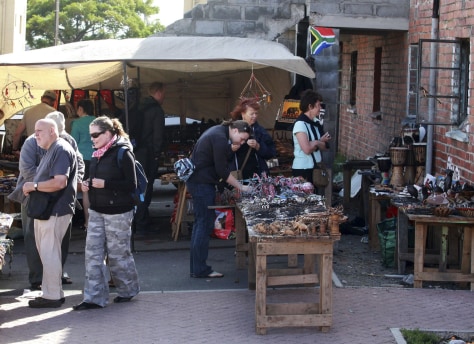By THANDISIZWE MGUDLWA Associated Press Writer
CAPE TOWN, South Africa (AP)—The Cape Town area is famous for
beaches, wine tours and Table Mountain, among other attractions. But on a
recent morning, a group of tourists set out to experience something
most visitors never see - the townships where black and mixed-race South
Africans were warehoused under apartheid.
“We want to show them the other side of Cape Town with this township
tour,” said Samantha Mtinini from Camissa Travel & Marketing. The
tours take visitors to homes, schools and markets in three townships
where they meet children, vendors and other residents.

The tour does not sugarcoat reality: Mtinini says the
townships remain impoverished and beset by crime. But the company
advertises the tours as a way to create jobs, as well as a way for
visitors to experience the humanity and culture of the people who live
there.
The tours might also make an interesting side trip for soccer fans
heading to South Africa for the World Cup, which kicks off June 11.
First of three stops on the tour
was Langa, a black township where the visitors were greeted by preschool
kids singing a welcome in Xhosa and English.
Langa is an area of shacks, schools, religious, sports and
recreational and cultural buildings. Traditional healers also do
business here, claiming to be able to cure just about everything, and to
clear evil spirits from homes and create luck for relationships and
business.
“We are born with spirits from ancestors,” Major Ndaba of the Langa
Herbal Chemist shop told the tourists. “People come to me for all sorts
of problems like business success and evil spirits.”
Just outside in the Joe Slovo shack settlement, Christopher Wanyoike awaited customers at his arts and crafts stall.
“My crafts are from all over Africa, from Kenya, Malawi, Zimbabwe,
Tanzania among others,” he said. He is among an army of Langa
entrepreneurs, from fruit and vegetable hawkers, to cooks barbecuing
meat al fresco to be served with umqombothi, frothy traditional African
beer for about $2 (14 rand) a liter.
Next the tour moved to Bonteheuwel. The sprawling colored, or
mixed-race, township was established after the forced removals in 1966
from an area known as District Six. District Six was a pocket of Cape
Town where South Africans of different races lived together until the
city council forced those who were not white to move far from their jobs
and the economic hive of the city center.
Under apartheid, South Africans of mixed-race were more privileged
than blacks, part of a divide-and-rule strategy to create tensions that
linger to this day. Bonteheuwel, compared to Langa, boasted more sports
fields and better schools with libraries and business centers.
Then it was on to Guguletu, another black township. There, tourists
saw new shacks built after apartheid ended in 1994, during an influx of
settlers from rural to urban areas.
Mtinini said that wherever space is available, people build shacks,
including just in front of the Gugulethu Seven monument, which
commemorates seven anti-apartheid activists killed by the security
police in 1987.
Nearby, another monument commemorates Amy Biehl, an American
Fulbright scholar killed in 1993 in Guguletu. Biehl, 26, who was white,
was studying how women were contributing to change in South Africa. Her
black assailants claimed the attack was part of the war on white rule.
Biehl’s attackers were granted amnesty after confessing before South
Africa’s Truth and Reconciliation Commission, set up to help the country
cope with the legacy of apartheid.
Two of her attackers now work for a
charity the Biehl family founded that has provided training in arts,
sports and other areas to young South Africans.
If You Go…
TOWNSHIP TOURS FROM CAPE TOWN: The Camissa company’s half-day tour is
$50 (380 rand). Details at http://www.gocamissa.co.za. The tour ends
with a lunch of grilled meat and a performance by a jazz band at the
famous Mzoli Meat Market.
Several other companies also offer tours. For information, visit these sites:
http://www.tcdtrsust.org
http://www.daytours.co.za
http://www.babitours.com
http://www.inkululekotours.co.za



